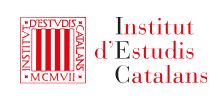The line of research in Biospeleology and prospecting of hypogean fauna has a long institutional and historical tradition. It was promoted by the illustrious entomologist, Curator and Director of the Museum, Dr. Francesc Español i Coll (1907-1999), a tireless, excellent teacher of young entomologists and speleologists, and it is still active nowadays. It should be noted that this long-standing collection project would not have been possible without the invaluable collaboration of the members of the Associació Catalana de Biospeleologia BIOSP (Catalan Association of Bioespeleology ) and the Federació Catalana d’Espeleologia FCE (Catalan Federarion of Speleology).
The persistent collecting activity carried out over almost a century has resulted in a collection of well over 100,000 specimens from the Iberian and North African regions, with representatives of the main groups of arthropods (crustaceans, arachnids, myriapods, insects, springtails, proturans and diplurans).
Nowadays, the study of the hypogean fauna has gained a new dimension thanks to the incorporation of molecular tools. In a context of global change, the genetic study of cave fauna is essential to assess the conservation status of these fragile environments. This objective is possible thanks to the close collaboration of the Museum’s Arthropods Department with the group led by Dr. Miquel Àngel Arnedo at the University of Barcelona (UB), both of which belong, at the same time, to the ZooSysEvo research group.
Research projects
-
SPELEOGENOMICS-2
- Year
- 2023
- Supported
- Institut d'Estudis Catalans
SPELEOGENOMICS-2 is a project that proposes to generate reference genomes for six highly specialized cave-dweller species representing all major lineages within arthropods. The focus will be on endemic or mostly circumscribed organisms in the area of influence of CBP (“Catalan Biogenome Project”). Cave-dwellers have converged to remarkably similar phenotypic and metabolic traits due to the strong selective forces exerted by the subterranean environment. Unfortunately, the extreme level of adaptation makes these species vulnerable to environmental changes. Caves are highly fragile habitats under constant threat due to ongoing pollution, land use change, touristic activities, or climate change. The proposed reference genomes will help to explore many scientific questions, such as their phylogenetic position and the genomic adaptations that facilitate their survival in extreme environments, as well as their demographic history and genetic variability, which will significantly aid in ongoing conservation efforts.
-
Barcoding III: Arthropods of the Hypogeum Environment of the Network of Natural Parks of the Diputació de Barcelona
- Year
- 2023
- Supported
- Diputació de Barcelona
- Duration
- 3 years
The primary aim is to ascertain the state of conservation of some of the hypogeous invertebrate species which are currently threatened or protected in Catalonia, as well as the state of conservation of their habitat.

